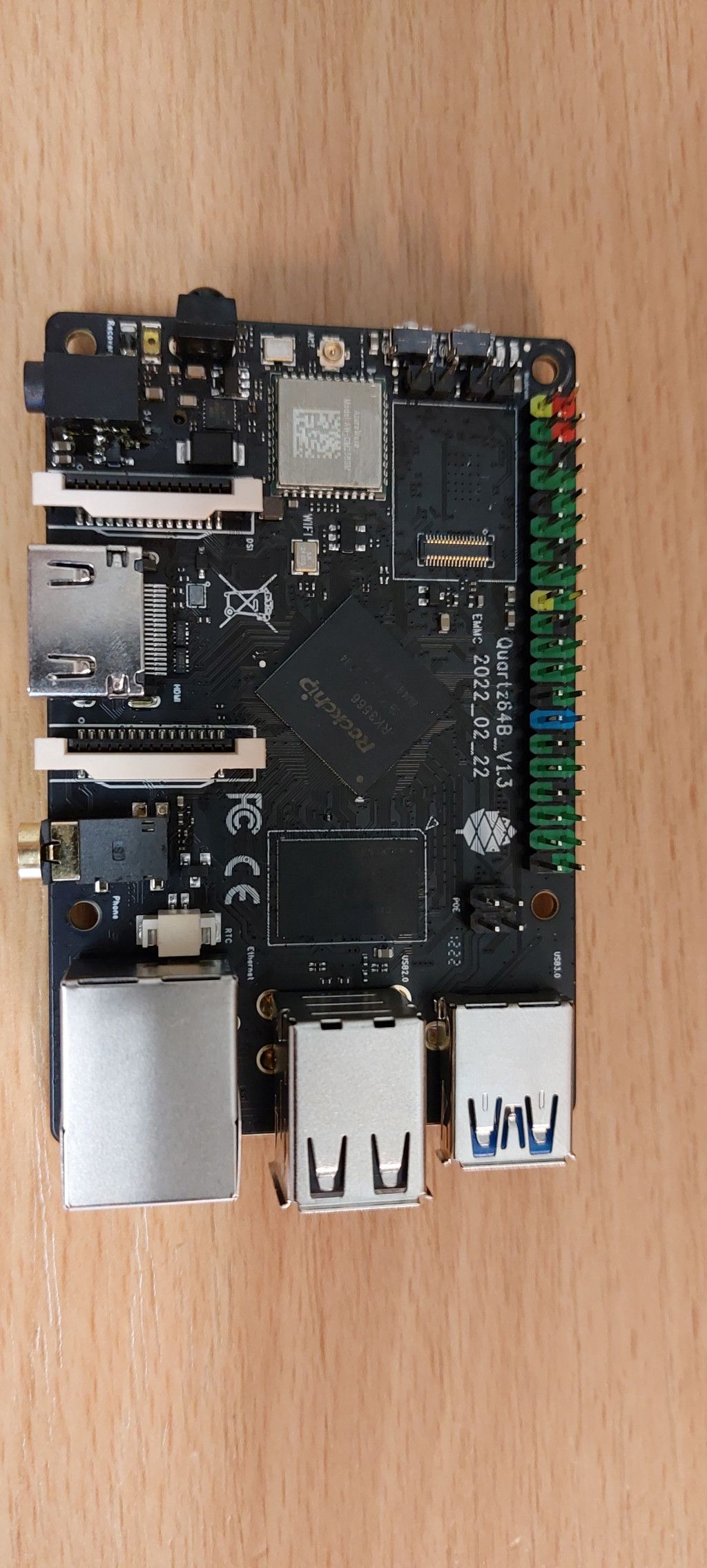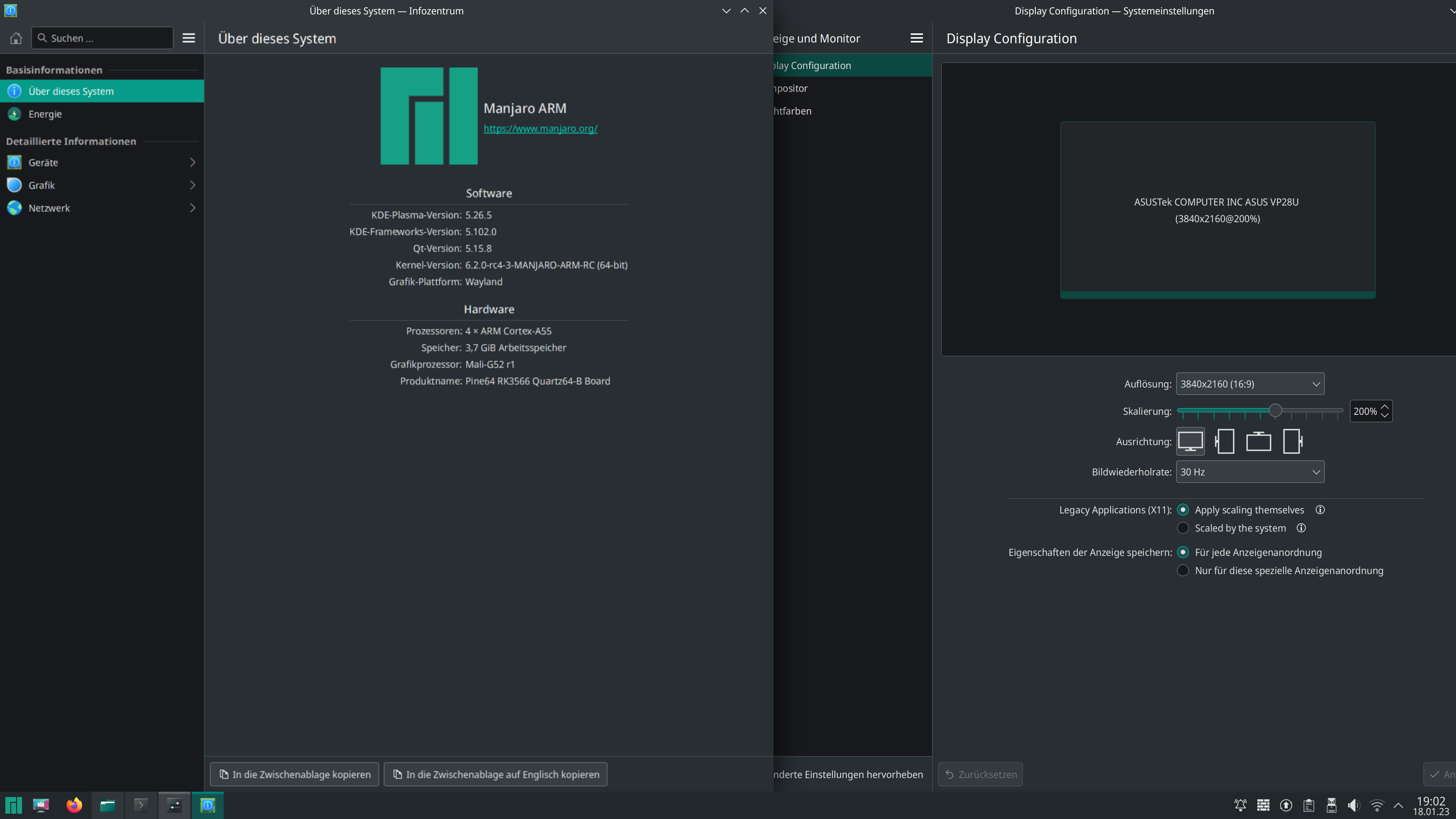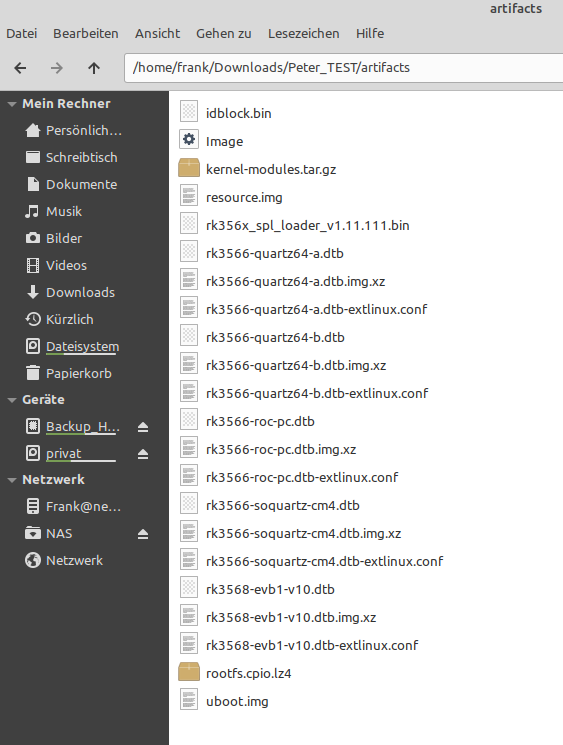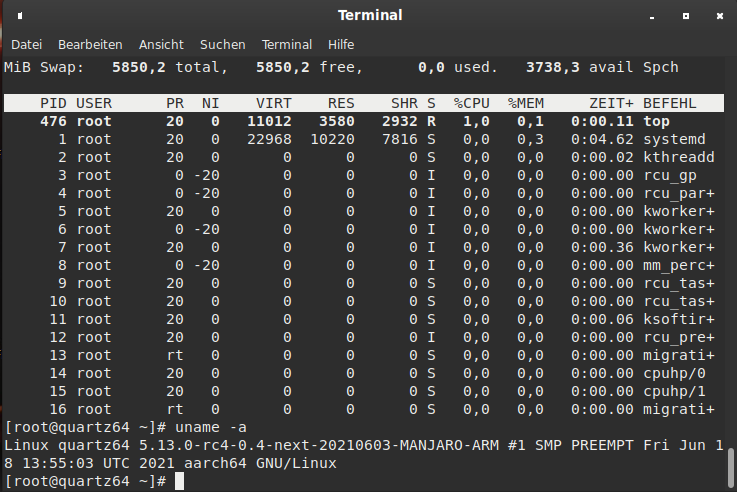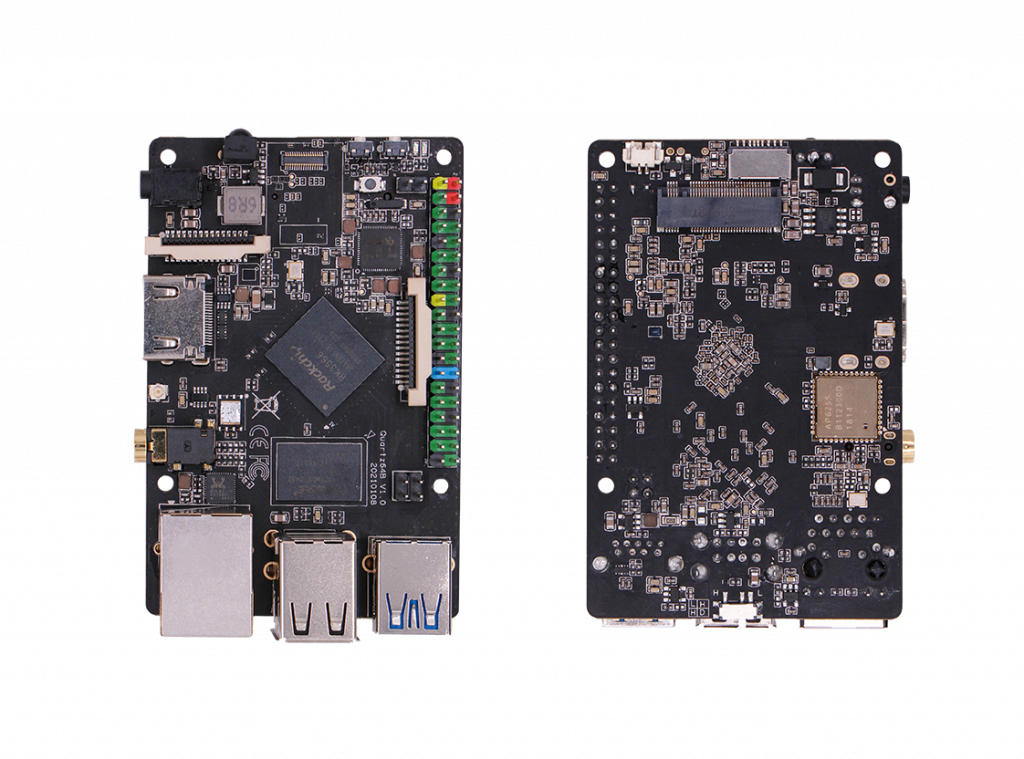Quart64 - Modell B - Was geht? (Manjaro Image)
-
Manjaro Image
Function State Note Boot Boot from sd-card yes Boot from eMMC Boot from USB2 Boot from USB3 Boot from PCIe NVMe SSD u-boot im SPI SPI present and responsive? CPU cores 4 max. 1,8 GHz cpufreq yes *3 Speed USB2 USB3 yes 336 MB/s *2 eMMC partly *7 PCIe yes 353MB/s (since 5.19 fixed) *4 Network UART yes *5 LAN yes 941/942 Mbits/sec since 5.17.0-3-MANJARO-ARM-Q64 *1 WiFi yes *6 Bluetooth partly Can pair a device, sound output stutters. HDMI Output yes u-boot over HDMI no Sound Sound over HDMI yes analog no Desktop KDE Plasma yes super smooth wayland session LAN *1
Seit 5.17.0-3-MANJARO-ARM-Q64 funktionsfähig.
[root@frank-pc boot]# iperf3 -c 192.168.3.213 Connecting to host 192.168.3.213, port 5201 [ 5] local 192.168.3.11 port 59118 connected to 192.168.3.213 port 5201 [ ID] Interval Transfer Bitrate Retr Cwnd [ 5] 0.00-1.00 sec 114 MBytes 952 Mbits/sec 0 477 KBytes [ 5] 1.00-2.00 sec 112 MBytes 939 Mbits/sec 0 477 KBytes [ 5] 2.00-3.00 sec 112 MBytes 939 Mbits/sec 0 477 KBytes [ 5] 3.00-4.00 sec 112 MBytes 943 Mbits/sec 0 581 KBytes [ 5] 4.00-5.00 sec 112 MBytes 942 Mbits/sec 0 581 KBytes [ 5] 5.00-6.00 sec 112 MBytes 939 Mbits/sec 0 581 KBytes [ 5] 6.00-7.00 sec 113 MBytes 945 Mbits/sec 0 581 KBytes [ 5] 7.00-8.00 sec 112 MBytes 938 Mbits/sec 0 581 KBytes [ 5] 8.00-9.00 sec 112 MBytes 942 Mbits/sec 0 581 KBytes [ 5] 9.00-10.00 sec 112 MBytes 936 Mbits/sec 0 581 KBytes - - - - - - - - - - - - - - - - - - - - - - - - - [ ID] Interval Transfer Bitrate Retr [ 5] 0.00-10.00 sec 1.10 GBytes 942 Mbits/sec 0 sender [ 5] 0.00-10.00 sec 1.09 GBytes 940 Mbits/sec receiver iperf Done. [root@frank-pc boot]# iperf3 -R -c 192.168.3.213 Connecting to host 192.168.3.213, port 5201 Reverse mode, remote host 192.168.3.213 is sending [ 5] local 192.168.3.11 port 59122 connected to 192.168.3.213 port 5201 [ ID] Interval Transfer Bitrate [ 5] 0.00-1.00 sec 112 MBytes 942 Mbits/sec [ 5] 1.00-2.00 sec 112 MBytes 941 Mbits/sec [ 5] 2.00-3.00 sec 112 MBytes 941 Mbits/sec [ 5] 3.00-4.00 sec 111 MBytes 933 Mbits/sec [ 5] 4.00-5.00 sec 112 MBytes 941 Mbits/sec [ 5] 5.00-6.00 sec 112 MBytes 942 Mbits/sec [ 5] 6.00-7.00 sec 112 MBytes 942 Mbits/sec [ 5] 7.00-8.00 sec 112 MBytes 942 Mbits/sec [ 5] 8.00-9.00 sec 112 MBytes 941 Mbits/sec [ 5] 9.00-10.00 sec 112 MBytes 941 Mbits/sec - - - - - - - - - - - - - - - - - - - - - - - - - [ ID] Interval Transfer Bitrate Retr [ 5] 0.00-10.00 sec 1.10 GBytes 942 Mbits/sec 348 sender [ 5] 0.00-10.00 sec 1.09 GBytes 940 Mbits/sec receiver iperf Done.USB3 *2
SSD Platte
Festplatte /dev/sda: 465,76 GiB, 500107862016 Bytes, 976773168 Sektoren Festplattenmodell: Portable SSD T5 Einheiten: Sektoren von 1 * 512 = 512 Bytes Sektorgröße (logisch/physikalisch): 512 Bytes / 512 Bytes E/A-Größe (minimal/optimal): 512 Bytes / 33553920 Bytes Festplattenbezeichnungstyp: gpt Festplattenbezeichner: EFF8AC7F-C9F0-4E7C-88B7-28FBA65213B9Geschwindigkeit
[root@frank-pc sda]# dd if=/dev/zero of=sd.img bs=4M count=4096 oflag=direct 4096+0 Datensätze ein 4096+0 Datensätze aus 17179869184 Bytes (17 GB, 16 GiB) kopiert, 51,1437 s, 336 MB/scpufreq *3
[root@frank-pc log]# cat /sys/devices/system/cpu/cpu*/cpufreq/cpuinfo_max_freq 1800000 1800000 1800000 1800000 [root@frank-pc log]# cat /sys/devices/system/cpu/cpu*/cpufreq/cpuinfo_cur_freq 816000 816000 816000 816000 [root@frank-pc log]# cat /sys/devices/system/cpu/cpu*/cpufreq/cpuinfo_cur_freq 1608000 1608000 1608000 1608000PCIe NVMe SSD
Eingesetzte SSD
Samsung SSD 970 EVO 500GBErgebnis
[root@frank-pc nvme]# dd if=/dev/zero of=sd.img bs=4M count=4096 oflag=direct 4096+0 Datensätze ein 4096+0 Datensätze aus 17179869184 Bytes (17 GB, 16 GiB) kopiert, 49,7777 s, 345 MB/sCrasht immer noch bei großen Datenmengen
[ 1161.427335] nvme nvme0: controller is down; will reset: CSTS=0x3, PCI_STATUS=0x2010 [ 1161.575266] nvme nvme0: Shutdown timeout set to 8 seconds [ 1161.584761] nvme nvme0: 4/0/0 default/read/poll queues [ 1192.146597] nvme nvme0: I/O 576 QID 1 timeout, disable controllerSeit Kernel 5.19 gefixt (10.06.2022)
[root@frank-pc ~]# iozone -e -I -a -s 100M -r 4k -r 16k -r 512k -r 1024k -r 16384k -i 0 -i 1 -i 2 Iozone: Performance Test of File I/O Version $Revision: 3.489 $ Compiled for 64 bit mode. Build: linux Contributors:William Norcott, Don Capps, Isom Crawford, Kirby Collins Al Slater, Scott Rhine, Mike Wisner, Ken Goss Steve Landherr, Brad Smith, Mark Kelly, Dr. Alain CYR, Randy Dunlap, Mark Montague, Dan Million, Gavin Brebner, Jean-Marc Zucconi, Jeff Blomberg, Benny Halevy, Dave Boone, Erik Habbinga, Kris Strecker, Walter Wong, Joshua Root, Fabrice Bacchella, Zhenghua Xue, Qin Li, Darren Sawyer, Vangel Bojaxhi, Ben England, Vikentsi Lapa, Alexey Skidanov, Sudhir Kumar. Run began: Fri Jun 10 20:50:38 2022 Include fsync in write timing O_DIRECT feature enabled Auto Mode File size set to 102400 kB Record Size 4 kB Record Size 16 kB Record Size 512 kB Record Size 1024 kB Record Size 16384 kB Command line used: iozone -e -I -a -s 100M -r 4k -r 16k -r 512k -r 1024k -r 16384k -i 0 -i 1 -i 2 Output is in kBytes/sec Time Resolution = 0.000001 seconds. Processor cache size set to 1024 kBytes. Processor cache line size set to 32 bytes. File stride size set to 17 * record size. random random bkwd record stride kB reclen write rewrite read reread read write read rewrite read fwrite frewrite fread freread 102400 4 52651 73501 75788 76263 45988 72502 102400 16 129067 178782 173857 178004 129091 174757 102400 512 341332 361853 350030 360213 349938 360332 102400 1024 354358 368632 367899 369145 369263 368756 102400 16384 385765 383026 381483 387990 386389 381380 iozone test complete.Und einmal mit dd
[root@frank-pc ~]# dd if=/dev/zero of=sd.img bs=4M count=4096 oflag=direct 4096+0 Datensätze ein 4096+0 Datensätze aus 17179869184 Bytes (17 GB, 16 GiB) kopiert, 48,6968 s, 353 MB/sUART *5
Bitte drauf achten, diese Schnittstelle arbeitet mit Level Shifting, was billige Adapter oft nicht abkönnen. Habe ich hier im Beitrag ausführlich erklärt, mit passenden Adapter, wenn es so wie bei mir nicht funktionierte.
WiFI *6
Bitte hier nachlesen -> https://linux-nerds.org/topic/1214/quartz64-modell-b-wifi
eMMC *7

Quartz64 - Modell B - eMMC
Mal ein Kurztest meines eMMC Moduls. Ich bin mir aber nicht sicher, ob das noch in Ordnung ist. Also das Modul mal in den Slot und gestartet. Sehen kann ich ...
linux-nerds.org (linux-nerds.org)
-
 F FrankM hat dieses Thema am angepinnt
F FrankM hat dieses Thema am angepinnt
